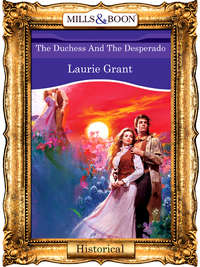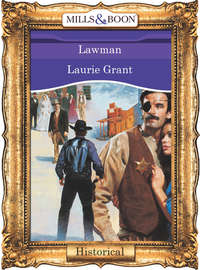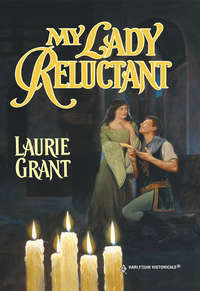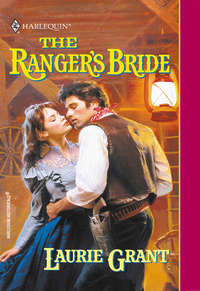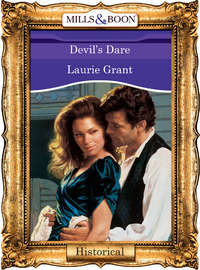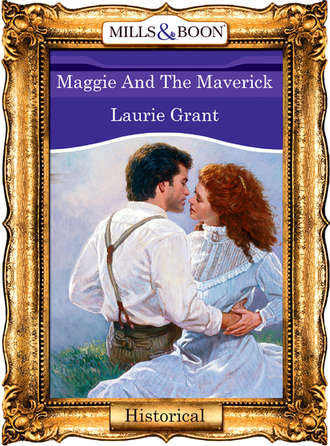
Полная версия
Maggie And The Maverick
“Don’t play the fool with me, woman—I don’t employ fools. You know exactly what I’m referring to,” he snarled. “I’m talking about your meddling back there. I know meddling comes as natural to you Yankees as breathing, but if you wish to remain here you’ll keep your Northern nose out of my business, is that clear?”
“Yes, sir.” She ground out the words, and watched as he mumbled something and kept walking.
Damn the man! He hadn’t even allowed her the courtesy of presenting her side! She had wanted to explain to him, to say, “I’m sorry, but I just couldn’t bear to see the boy disappointed, and you would have to wait for a reply in any case, so why not sit down and eat with your child?”
Clenching her gloved fists at her sides in frustration, she turned and stalked back to the newspaper office.
Jovita was just spreading out a tablecloth on the large table at the back of the office when Maggie returned. The boy was capering about, and when Maggie entered, he jumped up and down and crowed, “We’re gonna have a picnic! Me an’ Papa an’ Jovita an’ the pretty lady!”
“Yes, you are, niño,” Jovita said, smiling at him. “Why don’t you watch at the window for your papa and let us know if he comes while Senorita Harper and I spread out the food?”
It was a good way to keep the child from dropping any of the dishes or the jar of lemonade, Maggie thought, as Johnny went obediently to the window to watch down the street in the direction his father had gone.
“Please, call me Maggie,” she told the Mexican woman as she went forward to assist her at the table. She saw fried chicken, biscuits, a bowl of black-eyed peas and a peach pie.
“All right, Maggie,” Jovita said, her smile warming.
“So the señor who writes to Meester Devlin is really a senorita,” she said. “Eet is a good joke, no?”
“No,” Maggie said ruefully. “That is, I didn’t mean it as a joke, but I knew he wouldn’t consider me if he knew I was a woman. I…I’m afraid he’s rather angry—not only because I’m a woman, but also because I’m from the North.”
“He weel get over eet,” Jovita told her, her black eyes twinkling, “when he sees you do a good job.”
“Oh, I intend to,” Maggie assured her, buoyed by the woman’s vote of confidence. Then she darted a glance at Johnny, but the boy was staring at a grasshopper making its way over the glass, just out of his reach, and he was paying no attention to them.
Maggie lowered her voice and said, “I’d like to ask while Mr. Devlin is gone—why is he wearing a black armband? And is that why he’s so…so cross?”
A shadow passed over the older woman’s face, and she, too, checked to see if Johnny was paying any attention to them before she whispered back, “Eet ees for hees wife. She die some days ago, but he just learn of eet yesterday, you see? She was a silly woman, hees wife. She ran away from heem.”
Margaret felt her mouth drop open in shock. “She deserted him? And their child?” Now she understood the undercurrent of rage in his voice when he had spoken to her. His grief was still fresh, and mixed with that grief was an anger he was entitled to feel at his wife’s betrayal.
Ah, Maggie, you’re so perceptive all of a sudden, a voice within her mocked. You, who didn’t see what kind of man Richard Burke was until it was too late? Maybe Garrick Devlin made his wife’s life a hell on earth, as he may very well make yours as his employee. Somehow, though, her heart was sure that whatever had happened between him and his wife, Garrick had not been at fault, despite his sour temperament.
“Oh, dear,” she said aloud. She could hardly have come at a worse time.
“I do not theenk he means to be so cross,” Jovita said, laying a consoling hand on Maggie’s shoulder. “Eet ees not you. Eet ees hees wife, the war.he lost hees leg in the war, did you know that?”
“Yes, he told me,” Maggie said hastily. Actually, he had flung the words at her, hadn’t he? As if they were jagged stones.
The Mexican woman shrugged. “Eet ees many things. He has not had the boy a long time. They still get to know each other, you see.”
“I see,” Maggie murmured, but of course she didn’t.
“Hees brother Cal, the sheriff, he tell me much about thees woman who was hees wife,” Jovita informed her. “You ask heem sometime, st?”
“Oh, I’m sure it’s none of my business,” Maggie told the woman uncomfortably, but for some reason Jovita didn’t look at all convinced.
“You have never been married, señorita?” Jovita inquired.
The change of subject startled Maggie. “No,” she said, but she felt the betraying flush creep up her cheeks. Once, she had expected to be Mrs. Richard Burke by this time.
“Ah, but you have a sweetheart, no? He ees back where you came from?” Jovita asked, her face puzzled.
“No,” Maggie said, too quickly. “That is…there was someone.but we’re no longer, uh, courting.”
“Ah…” the woman murmured, and Maggie saw in her eyes that she had guessed much about Maggie’s former sweetheart.
She was afraid Jovita was going to probe further, and was wondering how she could politely evade the questions, when Johnny began jumping up and down and shouting that his father was coming down the street. And then Garrick Devlin was silhouetted by the sun in the entranceway.
“Everything ees ready, Senor Devlin,” Jovita said, motioning to the food and dishes spread out on the table. “Sit down and eat, you and Senorita Maggie and Johnny. You sent your wire, st?”
“Yes,” he murmured, but his eyes were on Maggie, who felt like a jackrabbit must feel when cornered by a cougar. A wounded, irritable cougar.
“Oh, but I wouldn’t dream of intruding on your dinner with your son, sir,” Maggie assured him, and wasn’t surprised to see her remark make his face relax a little. “Perhaps you could tell me if the hotel serves luncheon?”
“Of course you weel not eat at the hotel! There ees more than enough food for all three of you, Senorita Maggie. You weel eat here,” Jovita informed her. “Señor, I have theengs to buy for your household at the general store,” she said. “I weel leave Johnny weeth you while he eats and then come back for heem, sí? You can enjoy your son and get to know your new employee,” she said with a twinkle in her eye as she started walking to the door.
“You’re not staying?” Garrick protested. “But Jovita—” But the bell over the door was already tinkling as the Mexican woman exited.
“Let’s eat, Papa! The pretty lady can sit by me!” the boy cried, his eyes moving from his father to Maggie and back again. “Come sit here, pretty lady!”
Maggie bent to speak to the little boy. “Johnny, you may call me Miss Maggie,” she said with a smile, then turned to speak to his father. “Mr. Devlin, it’s not necessary,” she began. “I’ll just walk down to the hotel—”
“You’ll do no such thing, Miss Harper,” Garrick Devlin informed her, his eyes warning her not to protest further in front of his son, who was watching everything that passed between them. “Have a seat next to Johnny, there. I’ll need to discuss with you how I intend to run this newspaper in any case, so you might as well sit down and eat dinner with us.” He gestured toward the table, his invitation the very antithesis of the famous Southern hospitality.
That hospitality must be reserved for other Southerners, she thought ruefully, for as a Yankee she’d never received it.
Ah, well, he was just her employer. And if he didn’t like her, little Johnny seemed perfectly thrilled that she was going to eat with him and his papa, Maggie thought as the little boy settled himself on the chair between them and grabbed at a drumstick.
“Not yet, Johnny. Haven’t I taught you we must give thanks for our food before we eat?”
Before she bowed her own head, Maggie saw the little boy dutifully bow his and squeeze his eyes shut. Then she listened as Devlin briefly drawled grace.
The man had a beautiful voice, even if he was testy in the extreme, Maggie thought. Then she opened her eyes, to find him looking at her.
“Go ahead and help yourself to some chicken now, Johnny, Miss Harper,” he said, without looking away from her. “You’ll have to forgive my lack of eloquence in prayer, ma’am,” he said, irony dripping in the twangy, molasses-coated vowels. “My brother Cal’s the preacher in the family.”
“But…isn’t he the sheriff? At least, I thought that’s what Jovita said,” Maggie replied, then knew when he raised an eyebrow that she’d managed to say the wrong thing. She ducked her head and pretended to ponder her own selection of chicken.
“Oh, so my housekeeper’s already given you my complete family history,” he commented. “No doubt you’d have solved all my problems if I’d been gone five minutes more.”
“No, Mr. Devlin, I—”
He held up a hand to hush her. “No matter. I’m sure it’s just as well that you know my estimable brother Caleb is the sheriff of this little town, after having been a preacher before the war. In fact, you’d probably get along famously with him, as he fought alongside the Yankees rather than our own Southern boys.” There was bitterness in his voice as he divulged this surprising news.
She felt him watching her again, but she refused to give him the satisfaction of showing her curiosity.
Johnny’s interruption made that easier. “I like Uncle Cal—Aunt Livy, too!” he announced, waving his alreadybare drumstick like a baton. “And I like Grammy and Aunt Annie, and Uncle Sam and Aunt Mercy—she’s gonna have a baby! And I like my kitty cat!”
“You have a lot of family to like, Johnny,” Maggie said, feeling envious. Since her mother had died, she’d had only her absentminded father, and she sometimes thought James Harper forgot her existence except when they worked together at the newspaper.
She turned to Devlin after the boy started attacking a second drumstick. “So how did you decide you wanted to run a newspaper, Mr. Devlin?”
“I just got tired of beating all the men and boys of Brazos County at footraces, Miss Harper,” he said with a sardonic nod toward his wooden leg, which was extended stiffly out to the side of his chair.
Chapter Five
His sarcasm left Maggie feeling as if she’d just been slapped. For a moment she couldn’t get her breath, and then she was angry—so angry that she wished little Johnny wasn’t there so she could tell Garrick Devlin off before she quit and went to inquire about the next stage back to Austin. But little Johnny was there, and his presence stiffened her resolve. She’d be damned if she was going to let the man bait her into leaving before she’d even started.
“You have a.unique way of informing me it’s none of my concern, haven’t you, Mr. Devlin?” she replied in a voice that was as unruffled as she could possibly make it, so that the little boy wouldn’t notice the tension that thrummed between the adults. “Very well. Perhaps you should tell me what your goals and philosophy are in regards to your newspaper.”
He blinked at her composed response. Point for me, thought Maggie, but don’t expect me to be so restrained when your child is elsewhere. I haven’t got red hair for nothing.
“My goals and philosophy?” He leaned back in his chair and made a tent of his fingers. “Well, I reckon my goal is to start a newspaper worthy of the name, a paper that will expose the villainy of the carpetbaggers who have polluted our fair Texas soil, and the cancer of the scalawags who would sell Texas itself for the right price.”
She felt herself flushing as she realized he was again attempting to goad her.
“In other words, Texas right or wrong, is that your creed?” she retorted sweetly.
“Precisely, Miss Harper. Johnny, you may not have pie until you have some peas,” Devlin commanded his son, who’d taken advantage of his father’s inattention to try and cut an enormous slice of peach pie for himself.
Johnny looked sulky. “Does Miss Maggie have to eat ‘em, too?”
“Why, yes of course, Johnny,” Maggie told him with a smile. “That’s one vegetable we don’t have where I come from, and I find I quite like them.”
The boy appeared intrigued. “You don’t have no black-eyed peas?” he asked, looking as if he thought she must come from the moon for that to be true.
“Johnny, finish your dinner and let Miss Harper and your papa talk, please,” Devlin said. “Miss Harper, I intend for the motto on the Gazette’s masthead to be Forever The Truth For Texas. What do you think of that?”
Didn’t he ever give up? “Indeed, I think that the truth is all any newspaper should print, sir. And I’m curiouswhat did you use for start-up capital, if you don’t mind my asking?”
She watched as a guarded look swept over his face, and then a sardonic smile. “Do you mean how did I ever manage to find two bits to rub together after the Yankees moved in and the taxes went through the roof? It wasn’t easy, Miss Harper, in the face of that, but like all sneaky rebels, we had some silver buried in the backyard.”
She couldn’t be sure, but she thought he was being sarcastic again. “All right, but if I may ask, what are you using for operating capital?”
He blinked. “I beg your pardon, Miss Harper?”
“Operating capital,” she repeated. “You know, the cost of running your newspaper? The money that buys your ink and paper and pays for any needed repairs to that printing press over there? I see you have enough supplies to start.” She nodded toward the Washington handpress, sitting behind the counter in all its shiny black glory, toward a cabinet full of rows of type cases, cylinders of paper and bottles of ink behind it. Devlin had paid a pretty penny for that press, she imagined, and wondered where the money had come from. None of the former rebels seemed to have any money left after the war, and his clothes, though neat and clean, were far from new or fancy.
“Why, the sale of my paper will supply the operating capital,” he said, as if surprised. “I suppose it might occasionally be necessary to sell an ad to the general store, or print a Wanted poster for my brother the sheriff, or a handbill when Mayor Long is up for reelection, but I wish to keep my paper above the influence of those who would purchase space in it, Miss Harper. It’s far more important to devote the columns to exposing the evils presently existing in Texas—”
“Lofty ideals, Mr. Devlin, but as an experienced newspaperwoman, I can tell you that your paper will starve for lack of cash nourishment if you think you can run it on nothing more than what the townspeople will pay for it. What did you plan on charging, sir? A nickel? This is a small town, and even if everyone subscribes, you won’t make enough to keep it going. No sir, in my opinion, you will have to plan on selling advertisement space regularly. Most papers run each ad for at least six weeks, which is very easy with stereotypes, the woodcut-and-type blocks patent medicine makers furnish. And you will have to do away with job printing during the day if you hope to survive—the paper can always be printed at night.”
He looked momentarily dazed by all the information she had just thrown at him, but then he recovered, and Maggie could see he was restraining himself with some difficulty.
“Opinions are one thing you don’t seem to lack, Miss Harper,” he said at last. “Very well, I shall sell advertisement space. I imagine the proprietor of the general store will be happy to buy an ad on a regular basis. And then there’s the milliner, and the barber—and of course Doc Broughton is always peddling some nostrum or other. Yes, Johnny, you may have a piece of pie now that you’ve eaten your peas. Here, I’ll cut you a slice.”
Maggie decided she wouldn’t smash all his optimism in one sitting. She hadn’t met the businessmen of Gillespie Springs, of course, but from what she’d seen, a small-town merchant was notoriously reluctant to see the need to advertise when he had the only store of its kind for miles.
She was about to ask another question when Devlin began to speak again.
“Today is Tuesday,” he said, as if thinking aloud. “If we succeed in putting out our first edition tomorrow, we’ll plan on putting the paper out every Wednesday.”
She nodded, pleased that they were now on a more businesslike footing. “In your letter, you mentioned that there was a room upstairs that would be my living quarters-does that staircase in the corner of the room lead to it?”
“Yes, but I didn’t know you were a female then,” Devlin reminded her. “It’s out of the question for you to live upstairs now, of course. But you can rent a room at the boardinghouse over on North Street.”
Now it was Maggie’s turn to raise an eyebrow. “Why ever shouldn’t I live here? My board was part of the deal you offered, Mr. Devlin, and I doubt I can afford to pay board on the salary we agreed upon,” she informed him frankly. “As it is, I will have to buy my meals. And while you are not paying me the fifty cents an hour a male pressman could earn at any newspaper back East, I would like to be able to save some of my money. All Yankees are not born rich, despite what you may think.”
“But you can’t stay up there, a woman alone!” he sputtered. “It wouldn’t be proper!”
“Nonsense, sir. The door can be locked, can’t it? Having upstairs quarters will be very handy when we put the paper to bed late at night, as we will probably be doing tonight,” she said, then was amused to see him blush at the phrase.
“Miss Harper, perhaps all Yankee women speak as you do, but I’ll remind you to keep a civil tongue around my son,” he snapped, though Johnny had finished his pie and was once more pursuing a fly on the window glass.
She couldn’t help but laugh. “Mr. Devlin, that’s a perfectly usual term in the newspaper business,” she said, “not a lewd phrase at all. It means finishing that particular edition, and shutting down the press, and—”
“I can guess that,” he interrupted. “Just watch how you talk, if you please. Ah, there you are, Sweeney,” he said, as the telegrapher rushed in. “Were you able to get an answer from your source in Austin?”
“Yeah, I got lots a’ details for ya, Mr. Devlin,” said Sweeney, beaming with importance. “It’s sure ‘nough gonna set the folks in town on the boil, that’s fer dang sure!” Then he realized Maggie and the child were sitting there, and he clapped his bony hand over his mouth. “Oh, pardon me, miss.”
Maggie could tell her employer longed to inform Sweeney that her language could be much coarser than his “dang,” but he restrained himself. “Think nothing of it,” she murmured, and then the bell over the door tinkled again, announcing Jovita’s return.
“Eet ees time to come weeth me, niño,” the Mexican woman told Johnny as she entered, holding out her hand to the boy. “After your nap you can help me figure out what to make for supper for your papa, yes?”
“That won’t be necessary, Jovita. I won’t be home for supper tonight In fact, I may be very late.”
“But you must eat, señor, you and the señorita.”
“You fuss like a mother hen, Jovita, but I promise I won’t forget to feed Miss Harper. I’ll fetch us sandwiches from the hotel or something. Now go on home with Johnny. I have a paper to get out”
Maggie could see he was fairly fidgeting with impatience to get started. Well, for all his faults, at least Garrick Devlin was an eager newspaperman, and she could forgive a lot in the face of that. She remembered when the stories she’d been writing for her father’s newspaper had been allimportant to her, too. That had been before Richard, of course. Could she possibly regain her enthusiasm, working for a man who obviously hadn’t yet finished fighting the Civil War?
“All right, señor,” Jovita said. “Well, if Papa must be late tonight, Johnny, what would you theenk of going to visit your tio Cal and tia Livy?”
“Sí Jovita! See, Papa, she’s teachin’ me Mexican!” Johnny boasted.
“So I hear,” Garrick said approvingly. “I’ll see you later, son,” he added, but his wave was distracted as he snatched the paper, with its dots and dashes and the telegrapher’s transcription above it, from Sweeney. “Thanks, Sweeney. Remember to keep this quiet, will you?”
“You bet, Mr. Devlin. Nice meeting you, Miss Harper,” said the telegrapher as he backed out the door.
“Nice meeting you, too, Mr. Sweeney. Thank you for your quick work,” she added, and saw the man’s face light up as he exited.
And then she was alone with Devlin.
“Well, now you have two males in your thrall, my son and Sweeney,” commented Devlin sourly behind her. “Stop batting your eyelashes and take your bags on upstairs, if you’re still determined to room there. Change into something you won’t be afraid to get ink on, Miss Harper.”
“I’m sure I don’t know what you mean, Mr. Devlin,” she retorted with some spirit. “But never mind—I promise never to bat my eyelashes in your direction. Give me five minutes to change my clothes and I’ll be back, ready to work,” she said. Picking up her two heavy carpetbags, she headed for the stairs. She hoped five minutes would be long enough to cool both their tempers so that they could get some work done!
The room was small, and sparsely furnished with a bedstead, a chest of drawers, holding a washbasin and pitcher, and a table with a single, rickety-legged chair. A cloudy mirror hung above the chest. There was one window, which looked out over a back street lined with small houses, some of which were little more than rude shacks. Not exactly a scenic view, she thought. She would need to fashion some curtains for privacy at night. And no doubt the room, which was now delightfully airy with the spring breeze blowing through the open window, would be hot as Hades come summer, but at least it was hers alone.
Latching the door behind her, Maggie set her bags down on the bed and pulled out her workday clothes, a skirt and waist of a navy blue so dark it looked black except in bright sunlight. It had been washed and re-dyed many times, but ink stains hardly showed on it. Then, staying away from the window, she stripped off her traveling clothes and hung them on pegs on the back of the door. There would be time later to arrange her garments in the chest of drawers.
Some thoughtful soul—impossible to think it could have been Devlin—had put water into the pitcher, and she poured some onto a towel and used it to wash her face. Feeling refreshed, she combed out her hair and braided the fiery, curly strands.
Garrick Devlin could hardly be more different from the kindly, middle-aged man she had imagined, Maggie thought as she coiled the braid at the nape of her neck with a few hairpins. She had been expecting someone like her father, she realized, someone with James Harper’s gentle mien if not his looks.
She estimated Garrick Devlin to be anywhere from his mid-thirties to forty years of age, judging by the lines engraved around his eyes and mouth and the silver mixed into his dark hair. But his cynical, touchy disposition might make him seem older than he truly was. His face was a lean, hawkish one, with high cheekbones, a long, wellshaped nose and narrow eyes of that piercing blue that seemed an echo of the Texas skies. There was an impossibly arrogant set to his mouth that belied the weakness suggested by the cane he kept at his side.
All told, it was a stubborn, disagreeable face, at least when he looked at her—and yet she had seen that face change when he talked to Johnny. She had seen that he could smile, and that his smile transformed the rest of his tense features, relaxing them and making him look years younger and much more approachable—even handsome! she was surprised to realize.
Well, she had no further use for handsome, that was cer tain. All she hoped for was to be able to work with this difficult man to produce a newspaper they could both be proud of. She could teach him much, if he would let her. If only his stiff-necked pride didn’t get in the way! It wouldn’t be easy, since he despised what she was and everything she stood for, but she could at least try.



